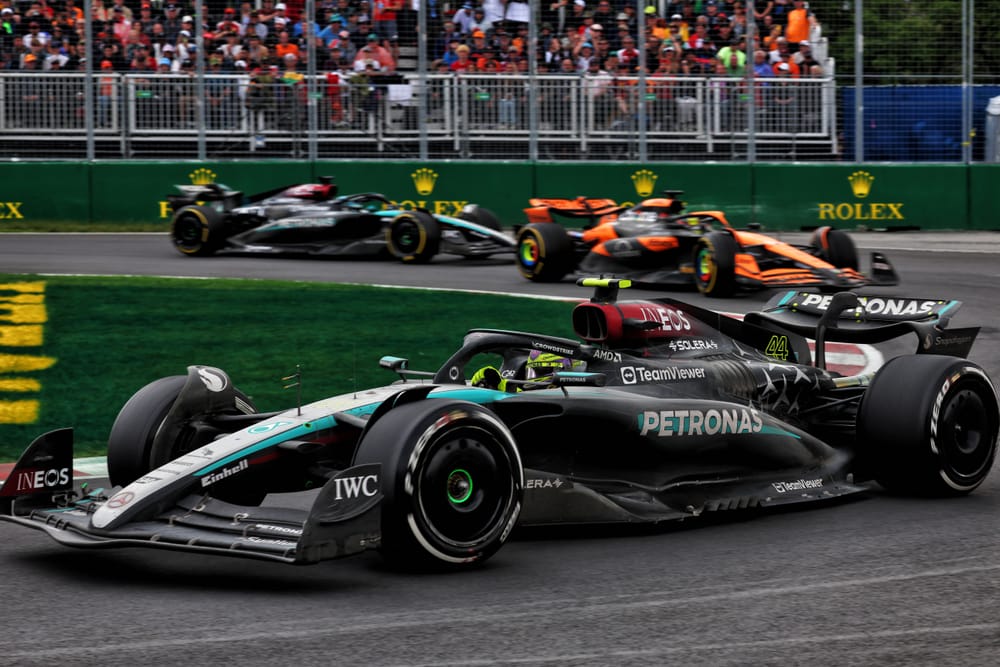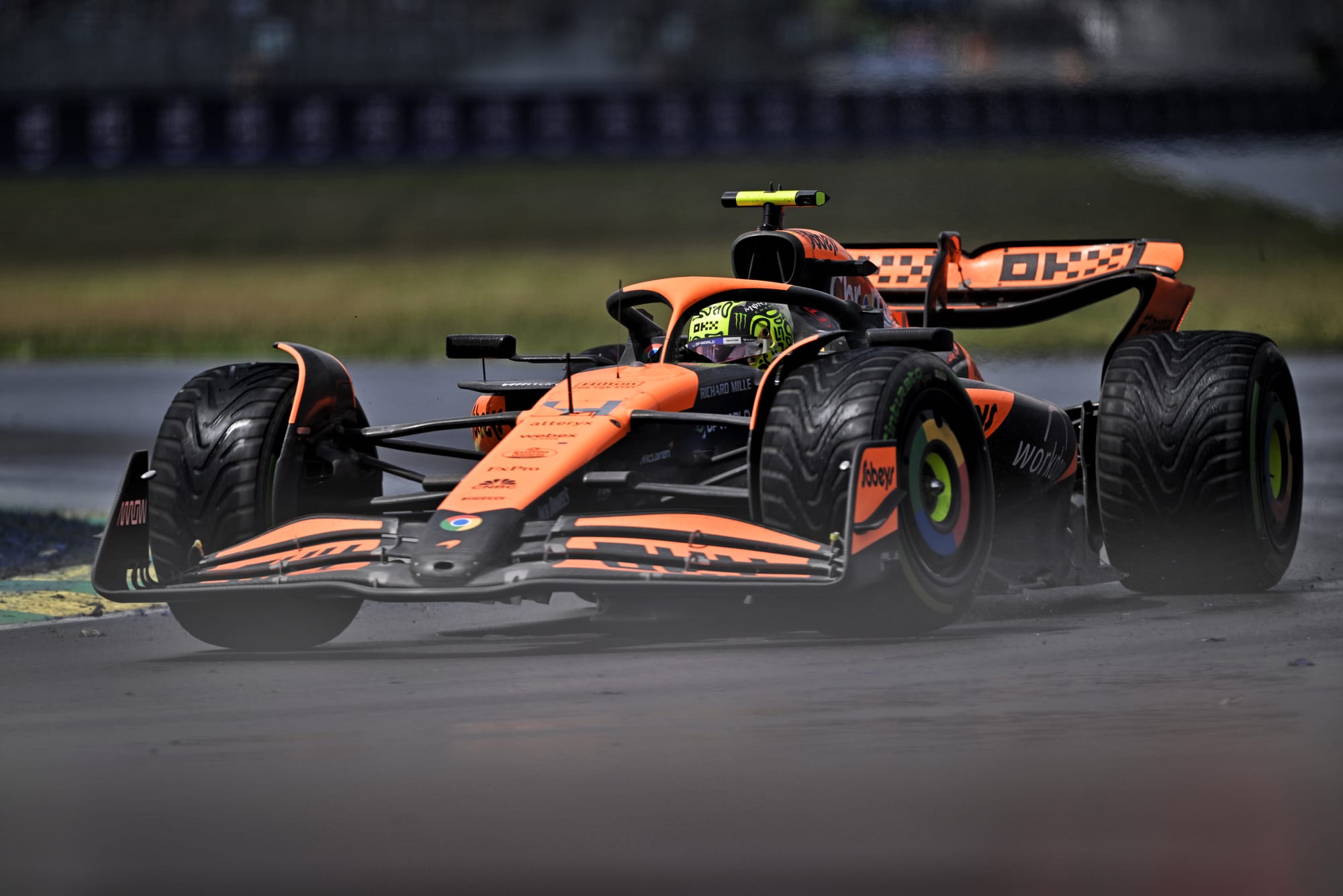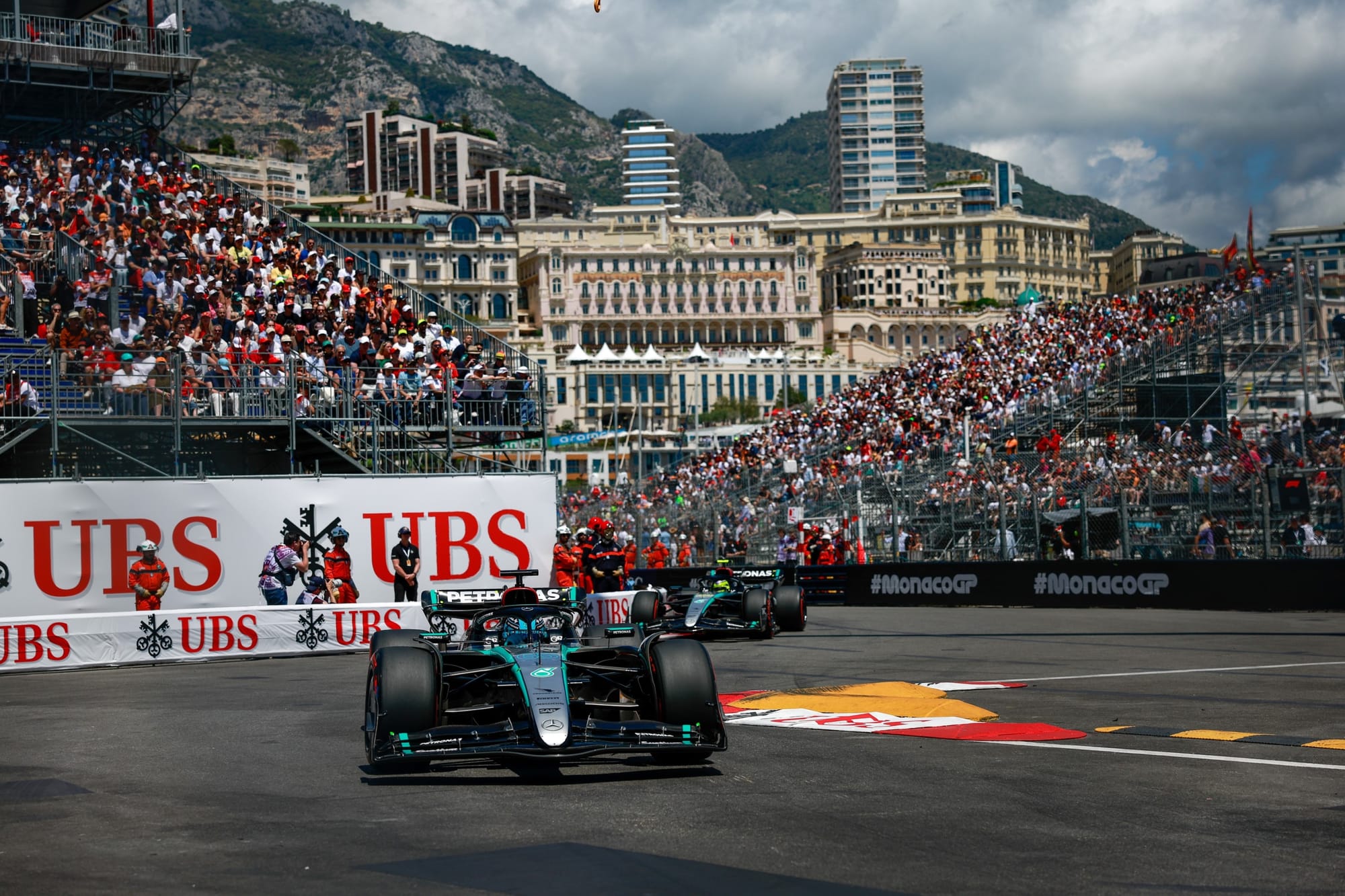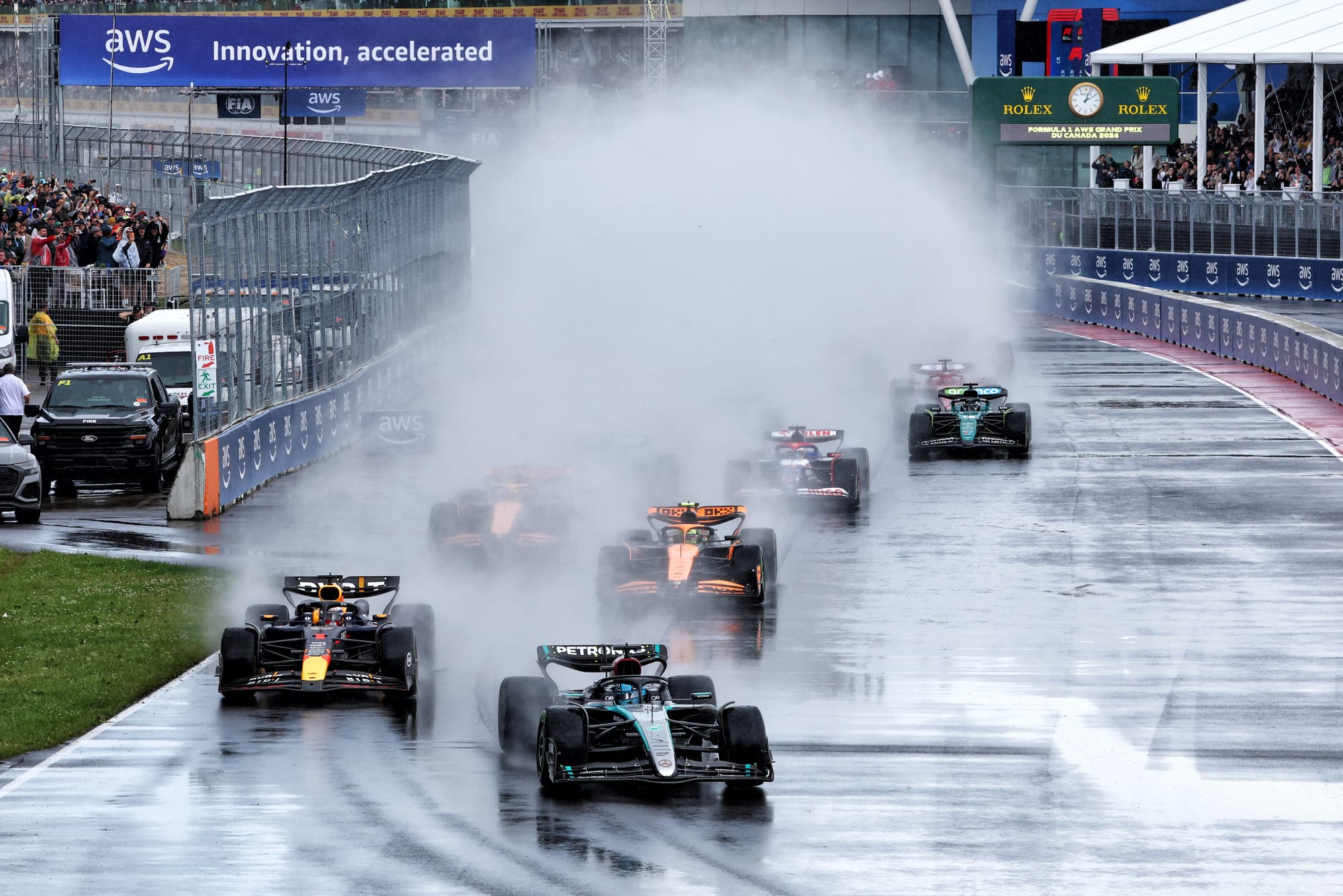Up Next

Mercedes’ best performance and result of 2024 was swiftly followed by admissions from both its Formula 1 drivers that they did not do a good enough job.
George Russell and Lewis Hamilton finished third and fourth in a Canadian Grand Prix that Russell started from pole, led early on, and fought in the lead group throughout.
Hamilton was not in that picture for much of the race after only qualifying seventh due a late slump that continued a difficult run of Saturdays this season, but a blend of patience and strong pace nearly earned him a podium ahead of Russell - despite a messy race.
It was, on paper, nothing to be particularly critical of. Especially as this was a very challenging race in mixed conditions. But each driver expressed a feeling that this was a missed opportunity given the big step in performance versus the norm in 2024.
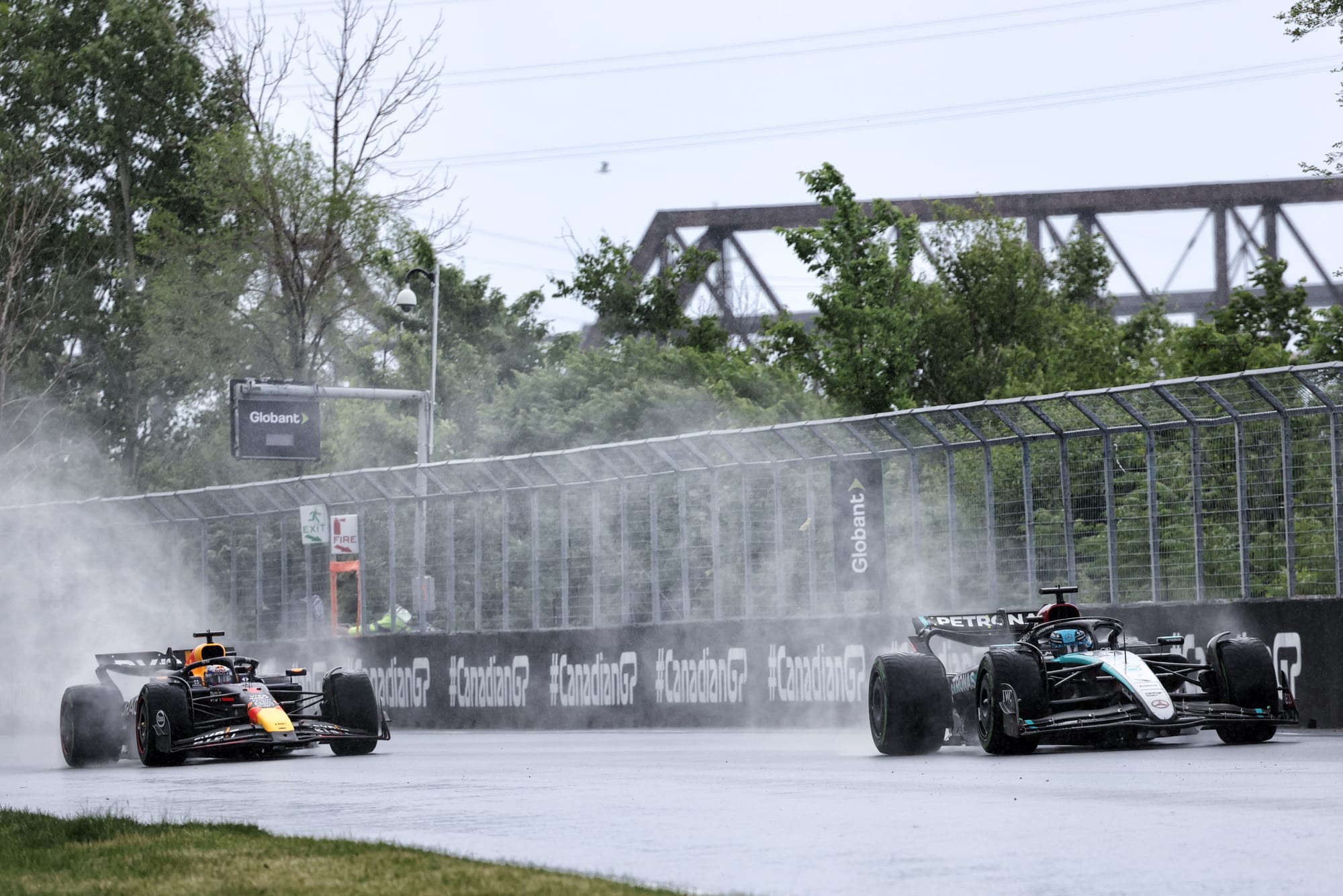
Russell's pole position meant he had the best opportunity, but he seemed to overuse his intermediates early on. That cost him vital track position to Max Verstappen and Lando Norris and after the timing of a safety car got him back ahead of Norris, he also made a mistake later in the race that dropped him behind the McLaren again.
After that he clashed with the other McLaren of Oscar Piastri, which dropped Russell as low as fifth. No wonder he admitted that “for me, it was just one too many mistakes at key moments that cost us a shot” at victory.
“I was so focused to get back on the podium because I felt like I let the team down a bit, just losing sight of Max and a few mistakes that put me in that position in the first place,” Russell said.
Hamilton arguably had a better race, but he was even more self-critical and lamented his performance as “one of the worst races I’ve driven”. While that was probably an exaggeration, this was definitely not a grand prix either driver could be said to have maximised.
As Hamilton said, “the car was capable of winning”, even though Mercedes boss Toto Wolff played down whether it truly had the pace to. “We dreamt about it,” Wolff said. “But in reality probably not.”
Wolff was understandably defensive of his drivers, adding: “Three and four is much better than we had in the last few races. So that's good.

“I think both drivers saw that more was up. We could have maybe gained a position or two and that's why there is a kind of negative sentiment that prevails.
“But if you would have given them third and fourth before the weekend probably they would have taken it.”
That is partly the point, though. When the opportunity is there, the Hamilton/Russell combination should be maximising it. It is widely considered to be F1’s best team-mate pairing but all agree that something was left on the table on the day Mercedes had its best opportunity of the year.
Mercedes has made good progress of late, and while there might have been specific circumstances this weekend related to track layout, weather conditions and grip levels, there is more reason than ever to believe the team might finally be getting on top of these rules.
That’s going to demand its drivers sharpen up. Russell is clearly in a happier place than Hamilton in qualifying at the moment, but being told by a rare Wolff radio message mid-race to “focus” after the error that dropped him behind Norris shouldn’t have to happen.
Russell’s speed is unquestionable but his judgement on how hard to push his tyres has sometimes warranted refinement, and so it was here, plus he has been guilty of too many unforced errors - this race last year being one such example.

Hamilton, meanwhile, still looks a real threat on Sundays - arguably quicker than Russell - but is often starting further back and can find himself getting stuck behind slower cars, playing catch-up, or simply running a different race to what might be possible if he was a few places better off on the grid.
His practice-to-qualifying slumps have garnered a lot of attention of late, but in Montreal from FP3 to qualifying Hamilton was simply neither quite as comfortable in the car nor with the margin of error he had previously enjoyed. He had the pace to do better, he just made small mistakes on both his Q3 laps. The fact he was consistently braking later than Russell and losing time on exit indicates he was asking a bit too much of the car on corner entry.
But what was really important in Canada was Hamilton’s accountability after the race. Recent comments he made in Monaco implied Hamilton suspected something was amiss with his qualifying form versus Russell and led to people interpreting that as Russell was being favoured.
In Canada, though, Hamilton accepted he was primarily responsible for his disappointing grid position, rather than other factors, and he knew the impact that had on a grand prix with big opportunities.
“Over the weekend [it was] just a really poor performance from myself,” he told Sky Sports F1.

“Yesterday [Saturday] some other things came into it but mostly myself. Then today one of the worst races I've driven, just lots of mistakes.
“If I'd have qualified better I'd have been in a much better position. I'll go back to the drawing board.”
What Hamilton needs, in his own words, is to “get my head on right” - then better results will follow. Taking responsibility for his qualifying results is already a step towards achieving that, because nothing good will come from assuming he can’t beat Russell on Saturdays (or worse, believing that something is going on to undermine him).
The silver lining for Hamilton is, as he said, this Mercedes is clearly becoming “a car we can fight with”. The pace is there to match or beat Russell on Saturdays, and his Sunday performances are not an issue.
Likewise, Russell must know that he has the speed to set himself up brilliantly for grands prix and just needs to execute things more cleanly and consistently.
These two excellent drivers have waited a long time for Mercedes to start producing a better car for this ruleset. If that’s what the team is finally doing, they need to be ready to take advantage.

